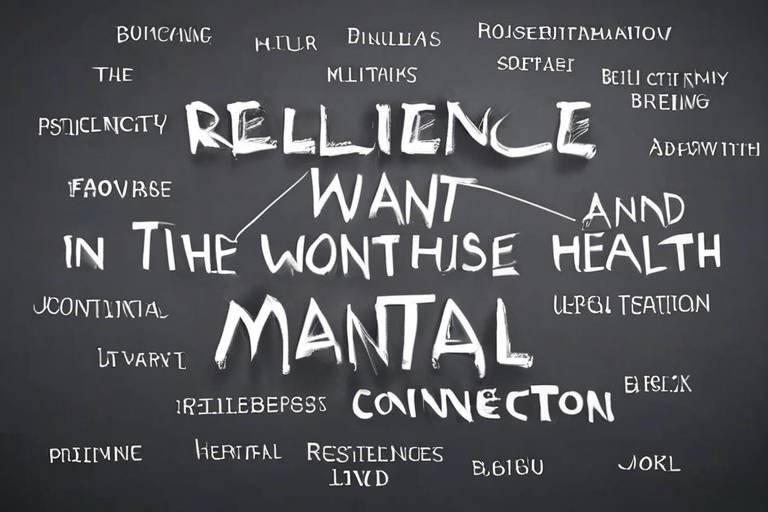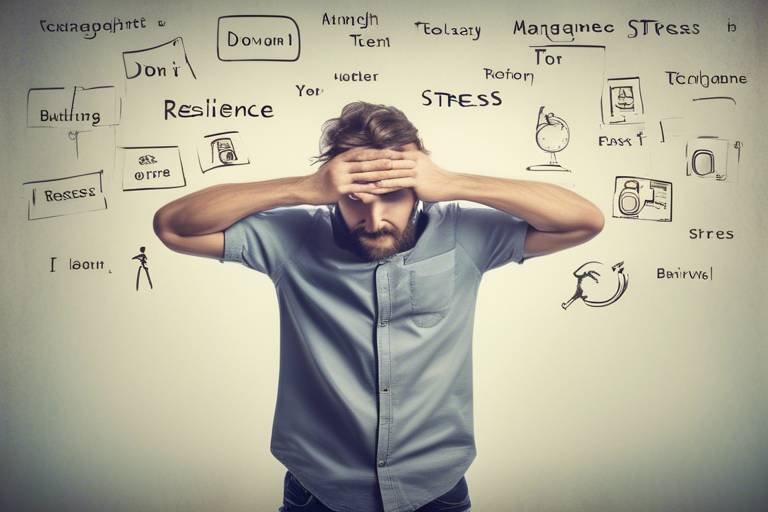Resilience and Mental Health - The Crucial Connection
In today’s fast-paced world, where challenges seem to lurk around every corner, the importance of resilience has never been more pronounced. But what exactly is resilience? It's not just about bouncing back from setbacks; it's about thriving in the face of adversity. This article explores the vital relationship between resilience and mental health, examining how building resilience can enhance emotional well-being and provide effective coping strategies in the face of life's challenges.
Resilience is often described as the ability to adapt well in the face of adversity, trauma, or stress. Think of it as a rubber band; when stretched, it returns to its original shape, sometimes even stronger than before. Resilience is characterized by several key traits: a positive outlook, emotional awareness, and the ability to manage stress effectively. But what contributes to this resilient mindset? Factors such as personal experiences, social support, and even our mindset play crucial roles in developing resilience.
Mental health significantly influences our overall well-being. It's the foundation upon which we build our lives, affecting everything from our relationships to our work performance. When we talk about resilience, we must also consider mental health awareness. How well we understand our mental health can directly impact our resilience. For instance, individuals who recognize their mental health challenges are often better equipped to seek help and develop coping mechanisms. This intersection between mental health and resilience is critical in navigating life's ups and downs.
Various factors, including genetics, environment, and lifestyle, impact mental health. Understanding these influences is essential for developing resilience. For example, consider the following:
- Genetic Influences: Genetic predispositions can play a role in mental health conditions. Some individuals may be more susceptible to anxiety or depression due to their genetic makeup. Understanding these factors can empower individuals to manage their mental health more effectively.
- Environmental Factors: The environment we grow up in, including social support and life experiences, significantly affects mental health. A supportive network can foster resilience, while a toxic environment can hinder it.
Research indicates that genetics can influence the likelihood of developing certain mental health conditions. If you have a family history of mental health issues, it doesn't mean you're destined to face the same struggles. Instead, it highlights the importance of being proactive about your mental health. By understanding your genetic predispositions, you can take steps to build resilience and mitigate potential challenges.
Our surroundings play a pivotal role in shaping our mental health. A nurturing environment filled with supportive relationships can help individuals develop resilience. On the contrary, a lack of support can lead to feelings of isolation and vulnerability. It’s essential to cultivate an environment that promotes mental well-being, as this can significantly enhance one’s ability to cope with challenges.
Developing resilience is not a one-time event but a proactive process. It requires intentional effort and practice. Here are some practical strategies to enhance resilience:
- Practice Self-Care: Prioritize your physical and mental health by engaging in activities that promote well-being, such as exercise, meditation, or hobbies.
- Foster Connections: Build strong relationships with friends, family, and community members who can provide support during tough times.
- Embrace Change: View challenges as opportunities for growth rather than obstacles. This shift in perspective can significantly enhance resilience.
The benefits of resilience are profound. Individuals who cultivate resilience often experience improved emotional regulation, allowing them to navigate stressors with greater ease. They develop better coping mechanisms, which in turn leads to enhanced mental health and overall life satisfaction. Resilience acts as a protective shield against the trials of life, enabling individuals to not just survive but thrive.
Incorporating resilience-building practices into daily routines can be transformative. For instance, consider setting aside time each day for reflection or gratitude journaling. These practices can shift your focus from what's going wrong to what’s going right, creating a more positive outlook. Additionally, engaging in regular physical activity can boost your mood and enhance your resilience.
Effective stress management is closely linked to resilience. Techniques such as mindfulness, deep breathing exercises, and time management can help individuals manage stress better. By developing these skills, you not only enhance your resilience but also promote a healthier mental state. Remember, it’s about creating a toolkit of strategies that you can draw upon when life gets tough.
In conclusion, fostering resilience is essential for maintaining good mental health. The journey toward resilience is ongoing and requires dedication and practice. By understanding the connection between resilience and mental health, you can take proactive steps to enhance your emotional well-being. So, why wait? Start your journey toward resilience today!
- What is resilience? Resilience is the ability to adapt and bounce back from adversity, trauma, or stress.
- How can I build resilience? You can build resilience by practicing self-care, fostering connections, and embracing change.
- Why is mental health important? Mental health is crucial as it affects every aspect of our lives, including relationships, work, and overall well-being.

Understanding Resilience
Resilience is often described as the ability to bounce back from adversity, but it’s so much more than that. It’s the mental reservoir of strength that we can call on in times of need. Think of resilience as a rubber band; it can stretch and bend under pressure but ultimately returns to its original shape. This ability to recover from setbacks is crucial in navigating the ups and downs of life.
To truly grasp what resilience entails, we should consider its key characteristics. Resilient individuals often exhibit:
- Emotional Awareness: They understand their emotions and can express them appropriately.
- Optimism: They maintain a hopeful outlook, believing that they can influence their circumstances positively.
- Flexibility: They adapt to changing situations rather than resisting them.
- Problem-Solving Skills: They approach challenges with a mindset geared towards finding solutions.
But what contributes to developing this resilient mindset? Several factors come into play:
- Life Experiences: Overcoming challenges in the past can strengthen an individual's resilience.
- Social Support: Having a network of friends and family provides a safety net during tough times.
- Self-Efficacy: Believing in one’s ability to succeed can greatly enhance resilience.
In essence, resilience is not an innate trait but a skill that can be cultivated over time. It requires intentional effort and practice, much like building muscle through exercise. Just as we wouldn’t expect to lift heavy weights without training, we can’t expect to handle life’s challenges without developing our resilience.
Moreover, resilience is not about avoiding stress or negative emotions. Instead, it’s about learning to navigate through them effectively. When we embrace our struggles and view them as opportunities for growth, we foster a mindset that enhances our overall mental health.
In the following sections, we will explore how resilience interacts with mental health and the various factors that can influence both. By understanding resilience better, we can equip ourselves with tools to face life’s challenges head-on.

The Role of Mental Health
Mental health is a cornerstone of our overall well-being, influencing how we think, feel, and act. It plays a crucial role in how we handle stress, relate to others, and make choices. When we talk about mental health, we’re not just discussing the absence of mental illness; instead, we’re looking at a state of well-being where individuals can realize their potential, cope with the normal stresses of life, work productively, and contribute to their communities. It’s a dynamic part of our lives that affects every aspect of our existence.
Understanding the connection between mental health and resilience is vital. Resilience acts as a buffer against the challenges and adversities we face. When our mental health is robust, we are more equipped to bounce back from setbacks. Conversely, when we experience mental health challenges, our resilience can be significantly diminished. This interplay creates a cycle where poor mental health can lead to reduced resilience, making it harder to cope with stressors.
Furthermore, mental health awareness is essential in recognizing the signs of distress. Many people may not realize they are struggling until it becomes overwhelming. By fostering an understanding of mental health, we can better identify when someone needs support. A supportive community can enhance resilience, providing the necessary resources and encouragement to navigate life's ups and downs.
To illustrate the importance of mental health, consider the following factors:
- Emotional Regulation: A healthy mental state allows individuals to manage their emotions effectively, which is crucial in stressful situations.
- Social Connections: Good mental health fosters strong relationships, which are essential for building resilience.
- Coping Mechanisms: Individuals with sound mental health are more likely to develop effective coping strategies, helping them tackle challenges head-on.
Ultimately, the role of mental health in our lives cannot be overstated. It is the foundation upon which resilience is built, allowing us to face life’s challenges with strength and determination. By prioritizing mental health, we can cultivate resilience, leading to a more fulfilling and satisfying life.
- What is resilience? Resilience is the ability to recover quickly from difficulties; it's the mental reservoir of strength that people use in difficult times.
- How does mental health affect resilience? Good mental health enhances resilience, enabling individuals to cope better with stress and adversity.
- Can resilience be developed? Yes, resilience can be cultivated through various strategies and practices, such as mindfulness, social support, and positive thinking.

Factors Affecting Mental Health
Mental health is a complex and multifaceted aspect of our overall well-being, influenced by a myriad of factors that intertwine to shape our psychological state. It's not just about feeling happy or sad; it's about how we respond to life's challenges and the resilience we exhibit in the face of adversity. Understanding these factors is crucial for anyone looking to enhance their mental health and build resilience.
One of the primary influences on mental health is genetics. Research suggests that individuals may inherit certain predispositions to mental health conditions. For instance, if you have a family history of depression or anxiety, you might be more susceptible to experiencing similar challenges. However, genetics alone doesn't determine your fate. It's essential to recognize that while you might have a genetic predisposition, environmental factors and personal choices play a significant role in shaping your mental health journey.
Speaking of environment, it’s another critical piece of the puzzle. The surroundings we grow up in and the experiences we encounter can either bolster or hinder our mental health. For example, a nurturing environment filled with supportive relationships can foster resilience, while a toxic or neglectful atmosphere can lead to mental health struggles. Here are some environmental factors that can impact mental health:
- Social Support: Having a network of friends and family who provide emotional support can significantly improve mental health outcomes.
- Life Experiences: Traumatic events, such as loss or abuse, can have lasting effects on mental health, but overcoming such experiences can also build resilience.
- Socioeconomic Status: Financial stability can alleviate stress, while economic hardships may contribute to mental health issues.
Moreover, lifestyle choices play a pivotal role in mental health. Factors like diet, exercise, and sleep can either enhance or impair our mental state. For instance, regular physical activity is known to release endorphins, the body's natural mood lifters, while a poor diet can lead to feelings of lethargy and depression. Sleep, too, cannot be overlooked; insufficient sleep has been linked to a host of mental health problems, including anxiety and depression.
In summary, the factors affecting mental health are diverse and interconnected. Genetics, environment, and lifestyle choices all contribute to our mental health landscape. By understanding these influences, we can take proactive steps to enhance our resilience and overall well-being. It's like building a house; you need a strong foundation (genetics), sturdy walls (environment), and a well-maintained roof (lifestyle) to create a safe and supportive space for your mental health to thrive.
- What is the most significant factor affecting mental health? While there isn't a single factor that stands out, genetics, environment, and lifestyle all play crucial roles in shaping mental health.
- Can resilience be developed? Absolutely! Resilience is not a fixed trait; it can be cultivated through various strategies and practices.
- How does social support influence mental health? A strong social support network can provide emotional comfort and practical assistance, significantly improving mental health outcomes.

Genetic Influences
When we talk about resilience, it’s hard to ignore the that shape our mental health. Just like a tree’s roots determine how well it withstands a storm, our genes can significantly impact our ability to bounce back from life's adversities. Research has shown that certain genetic factors can predispose individuals to mental health conditions, which can, in turn, affect their resilience. For instance, variations in genes related to serotonin, a neurotransmitter that plays a crucial role in mood regulation, can influence how we respond to stress.
Moreover, understanding these genetic influences can empower individuals. By recognizing that some aspects of our mental health are inherited, we can take proactive steps to build resilience. It’s like knowing your family history of heart disease; you can choose to adopt a healthier lifestyle to mitigate risks. Similarly, if you know you have a genetic predisposition to anxiety or depression, you can seek support and develop coping strategies tailored to your needs.
Here’s a simple breakdown of how genetics can influence resilience:
| Genetic Factor | Impact on Resilience |
|---|---|
| Serotonin Transporter Gene (5-HTTLPR) | Affects mood regulation and stress response |
| Brain-Derived Neurotrophic Factor (BDNF) | Influences neuroplasticity and recovery from stress |
| Cortisol Response Genes | Modulates stress hormone levels and emotional resilience |
While genetics play a role, they don’t write our entire story. Think of it as a script where you are the director. You can choose how to interpret and perform your role, even if the script has some challenging lines. By combining genetic insights with lifestyle choices and therapeutic interventions, individuals can cultivate resilience. This proactive approach not only helps in managing potential mental health challenges but also fosters a sense of empowerment and control over one’s life.
In conclusion, while our genetic makeup may set the stage for certain mental health outcomes, it’s our actions and choices that ultimately shape our resilience. Embracing this understanding can lead to better mental health management and a more fulfilling life.
- What is resilience? Resilience is the ability to bounce back from adversity and maintain emotional well-being despite challenges.
- How do genetics affect mental health? Genetic predispositions can influence the likelihood of developing mental health conditions, thereby affecting resilience.
- Can I improve my resilience? Yes! Resilience can be developed through various strategies such as building social support, practicing mindfulness, and adopting a positive mindset.
- Is resilience important for everyone? Absolutely! Resilience is crucial for everyone as it helps in coping with stress and enhances overall mental health.

Environmental Factors
When we talk about resilience, we can't ignore the power of our environment. It’s like the soil that nurtures a plant; without the right conditions, even the strongest seed may falter. Our surroundings—be it the people we interact with, the places we inhabit, or the experiences we encounter—play a pivotal role in shaping our mental health and resilience.
To put it simply, a nurturing environment can bolster our ability to bounce back from life's challenges. Think of it this way: if you’re surrounded by supportive friends and family, it’s much easier to face the storms of life compared to someone who feels isolated and unsupported. Social support is a key element here. Research shows that individuals with strong social networks tend to have better mental health outcomes. They can share their struggles, seek advice, and receive encouragement, which can be invaluable during tough times.
Moreover, life experiences also significantly influence resilience. Positive experiences, such as achieving personal goals or overcoming obstacles, can enhance our coping mechanisms. On the flip side, negative experiences, like trauma or chronic stress, can hinder our ability to recover. It’s crucial to understand that while we can’t control every aspect of our environment, we can actively seek out and cultivate supportive relationships and positive experiences.
Here are some key environmental factors that contribute to resilience:
- Social Support: Having a network of friends and family who provide emotional and practical support.
- Community Resources: Access to mental health services, recreational activities, and educational opportunities.
- Safe Environment: Living in a safe, stable neighborhood reduces stress and promotes well-being.
- Cultural Beliefs: Cultural values that emphasize community, support, and resilience can foster a more resilient mindset.
In essence, our environment acts as a double-edged sword. It can either uplift us or pull us down. By consciously choosing to surround ourselves with positive influences and seeking environments that promote growth, we can significantly enhance our resilience. Just like a tree that bends with the wind but doesn’t break, a resilient person adapts to their surroundings, drawing strength from the support that’s available to them.
- What are some ways to improve my environment for better resilience?
Consider connecting with supportive friends, engaging in community activities, and creating a safe and positive home environment. - Can resilience be developed over time?
Absolutely! Resilience is not an innate trait but a skill that can be cultivated through experiences and intentional practices. - How does social media impact resilience?
Social media can offer both support and stress. It’s important to curate your online interactions to foster positive connections.

Building Resilience
Building resilience is not just a one-time effort; it's a proactive journey that requires consistent practice and dedication. Think of resilience as a muscle; the more you work on it, the stronger it becomes. So, how do you start this journey? Well, there are several practical strategies that can significantly enhance your resilience and ultimately improve your mental health outcomes.
One of the first steps in building resilience is to cultivate a positive mindset. This involves shifting your perspective on challenges and viewing them as opportunities for growth rather than insurmountable obstacles. When faced with a setback, ask yourself, "What can I learn from this?" or "How can this experience help me grow?" This reframing can help you approach difficulties with a more constructive attitude.
Another essential strategy is to develop strong social connections. Humans are inherently social beings, and having a solid support system can make a world of difference in tough times. Surround yourself with positive influences—friends, family, or even support groups—who uplift you and provide encouragement. When you feel connected to others, you're more likely to bounce back from adversity.
Moreover, engaging in self-care practices is crucial for building resilience. This can include a variety of activities that promote your physical and mental well-being, such as:
- Regular exercise
- Mindfulness and meditation
- Healthy eating habits
- Getting enough sleep
These practices not only enhance your physical health but also contribute to a more resilient mindset by reducing stress and improving your emotional regulation.
Additionally, setting realistic goals can be a game-changer. Break down larger tasks into smaller, manageable steps, and celebrate your achievements along the way. This approach can help you feel a sense of accomplishment and motivate you to keep pushing forward, even when things get tough.
Finally, don't underestimate the power of flexibility. Life is unpredictable, and being adaptable can significantly enhance your resilience. When plans change or unexpected challenges arise, try to remain open-minded and willing to adjust your approach. This flexibility allows you to navigate life's ups and downs with greater ease and confidence.
In summary, building resilience is an ongoing process that involves cultivating a positive mindset, fostering social connections, engaging in self-care, setting achievable goals, and remaining flexible. By implementing these strategies, you can enhance your ability to cope with life's challenges and improve your overall mental health.
Q: Can anyone build resilience?
A: Absolutely! Resilience is a skill that can be developed over time with practice and commitment.
Q: How long does it take to build resilience?
A: Building resilience is a personal journey, and the timeline varies for everyone. Consistent effort over weeks and months can lead to significant improvements.
Q: Are there specific exercises to enhance resilience?
A: Yes! Activities like journaling, mindfulness meditation, and engaging in physical exercise are great ways to build resilience.
Q: How does resilience impact mental health?
A: Resilience helps individuals cope with stress and adversity, leading to better mental health outcomes and overall life satisfaction.

Benefits of Resilience
Resilience is more than just a buzzword; it’s a powerful tool that can dramatically enhance our emotional landscape and overall life satisfaction. When we think about resilience, we often picture someone who can withstand storms without crumbling. But what does that really mean for our everyday lives? Well, the benefits of cultivating resilience are vast and impactful, touching various aspects of our mental health and leading us toward a more fulfilling existence.
First and foremost, one of the most significant benefits of resilience is improved emotional regulation. Imagine being in a challenging situation—perhaps you’ve just received some disappointing news. A resilient person can acknowledge their feelings without being overwhelmed by them. They understand that it’s okay to feel upset, but they also know how to manage those emotions effectively. This ability to navigate through emotional upheaval not only helps in personal situations but also fosters better relationships with others.
Moreover, resilience equips individuals with better coping mechanisms. When life throws curveballs, resilient people are more likely to respond with adaptability rather than despair. They can draw upon a toolkit of strategies—whether it’s seeking social support, practicing mindfulness, or reframing negative thoughts. This proactive approach to life’s challenges means that they can bounce back more quickly, reducing the duration and intensity of stress. Here’s a quick look at some of these coping strategies:
- Mindfulness Practices: Techniques such as meditation and deep breathing can help ground individuals during stressful times.
- Social Support: Building a network of friends and family who can provide guidance and comfort is invaluable.
- Positive Thinking: Reframing negative thoughts into more positive, constructive ones can change the narrative of adversity.
Another major advantage of resilience is its role in fostering greater life satisfaction. Resilient individuals often report feeling more fulfilled and content with their lives. Why? Because they see challenges as opportunities for growth rather than insurmountable obstacles. This shift in perspective can lead to a more optimistic outlook, making it easier to pursue goals and embrace new experiences. It’s like viewing a mountain not as a barrier but as a challenge to climb, leading to new vistas and achievements.
Furthermore, resilience can contribute to physical health as well. Stress is known to have detrimental effects on the body, contributing to various health issues such as heart disease and weakened immune function. By managing stress effectively through resilience, individuals can mitigate these risks. A resilient mindset encourages healthy lifestyle choices, such as regular exercise, balanced nutrition, and adequate sleep—all of which are crucial for maintaining both mental and physical health.
In summary, the benefits of resilience are multifaceted, encompassing emotional regulation, better coping mechanisms, increased life satisfaction, and improved physical health. By investing in our resilience, we create a solid foundation for navigating life's ups and downs. It’s not just about surviving; it’s about thriving in the face of adversity. So, the next time you’re faced with a challenge, remember that resilience is your ally, ready to help you rise above and emerge stronger than before.
Q: Can anyone develop resilience?
A: Absolutely! Resilience is not an inherent trait; it can be cultivated through practice and intentional strategies.
Q: How long does it take to build resilience?
A: Building resilience is a lifelong journey. Some may notice improvements quickly, while for others, it may take more time and consistent effort.
Q: Are there specific activities that can enhance resilience?
A: Yes! Activities such as journaling, engaging in physical exercise, and seeking social connections can significantly enhance resilience.

Resilience in Daily Life
Incorporating resilience-building practices into our daily lives can truly be a game changer. Think of resilience as a muscle; the more you exercise it, the stronger it becomes. Just like you wouldn’t skip leg day at the gym, you shouldn’t overlook the small, everyday actions that can foster resilience. So, how can we weave resilience into the fabric of our daily routines? Let's explore some practical strategies that can help.
First off, it's essential to cultivate a positive mindset. This doesn’t mean ignoring the challenges we face; rather, it involves reframing our thoughts. When faced with a setback, instead of thinking, “Why does this always happen to me?” try asking, “What can I learn from this experience?” This shift in perspective can significantly enhance your ability to cope with difficulties. Remember, every challenge is an opportunity for growth.
Another effective way to build resilience is through social connections. Surrounding yourself with supportive friends and family can provide a safety net during tough times. It’s like having a sturdy bridge to cross over turbulent waters. Make it a habit to reach out to loved ones, share your thoughts, and listen to their experiences. Engaging in community activities or volunteering can also foster a sense of belonging and purpose, further strengthening your resilience.
Additionally, practicing mindfulness and self-care is critical. Set aside time each day to engage in activities that recharge your batteries. This could be anything from meditation, yoga, or simply taking a quiet walk in nature. These moments of reflection and relaxation can help clear your mind and enhance your emotional well-being. Consider establishing a daily routine that includes:
- Morning affirmations: Start your day with positive affirmations to set a constructive tone.
- Gratitude journaling: Write down three things you’re grateful for each day; this can shift your focus from what’s wrong to what’s right in your life.
- Mindful breathing: Take a few minutes to practice deep breathing exercises to calm your mind and reduce stress.
Incorporating these practices into your daily life can create a solid foundation for resilience. But let’s not forget about the importance of setting realistic goals. Break down larger tasks into smaller, manageable steps. This approach not only makes daunting projects feel less overwhelming but also gives you a sense of accomplishment as you check off each small victory. Think of it as climbing a mountain; you wouldn’t try to leap to the summit in one go. Instead, you’d take it one step at a time, enjoying the view along the way.
Lastly, remember that resilience is not a destination but a journey. It requires ongoing effort and commitment. Celebrate your progress, no matter how small, and don’t hesitate to seek help when needed. Just like a gardener nurtures a plant, you must tend to your resilience, providing it with the care and attention it deserves. So, go ahead and embrace these strategies, and watch as your resilience blossoms in the face of life’s challenges.
Q: What is resilience?
A: Resilience is the ability to bounce back from adversity and adapt to challenging situations. It involves maintaining a positive mindset and utilizing coping strategies to manage stress.
Q: How can I build resilience?
A: You can build resilience by cultivating a positive mindset, fostering social connections, practicing mindfulness, and setting realistic goals. Incorporating these practices into your daily routine can significantly enhance your resilience.
Q: Is resilience the same for everyone?
A: No, resilience can vary from person to person based on individual experiences, personality traits, and support systems. However, everyone can develop and strengthen their resilience over time.
Q: Can resilience improve my mental health?
A: Absolutely! Building resilience can lead to improved emotional regulation, better coping mechanisms, and overall enhanced mental health and life satisfaction.

Resilience and Stress Management
When it comes to navigating the choppy waters of life, resilience is your life jacket. It keeps you afloat during tumultuous times, allowing you to manage stress effectively and emerge stronger than before. But how exactly does resilience help in managing stress? Well, think of it as a muscle: the more you train it, the stronger it becomes. By developing resilience, you equip yourself with a toolkit of strategies that can help you tackle stressors head-on rather than letting them overwhelm you.
One of the key aspects of resilience is the ability to maintain a positive outlook, even in the face of adversity. This doesn’t mean ignoring your problems; instead, it’s about approaching challenges with a mindset that sees opportunities for growth. Imagine you’re climbing a mountain. Every rocky step you take may feel exhausting, but with each step, you’re not just moving closer to the summit; you’re also building strength and endurance. This is the essence of resilience in stress management.
To effectively manage stress through resilience, consider implementing some of the following strategies:
- Practice Mindfulness: Being present in the moment can help you detach from overwhelming thoughts and emotions. Techniques like meditation or deep-breathing exercises can ground you and provide clarity.
- Establish a Support Network: Surrounding yourself with supportive friends and family can bolster your resilience. They can provide a listening ear or a shoulder to lean on when times get tough.
- Set Realistic Goals: Break down your challenges into manageable tasks. Achieving small milestones can boost your confidence and reduce stress.
- Embrace Change: Flexibility is a hallmark of resilience. Accepting that change is a part of life can help you adapt more easily to new situations.
Additionally, it’s essential to recognize how stress manifests in your life. Stress can be a silent thief, robbing you of joy and peace. By identifying your stressors—whether they stem from work, relationships, or personal expectations—you can tailor your resilience strategies to address these specific challenges. For instance, if work-related stress is your primary concern, consider developing time management skills or setting boundaries to create a healthier work-life balance.
Moreover, resilience isn't just a solo journey. Engaging in community activities or volunteering can enhance your sense of belonging and purpose, which are crucial for mental well-being. When you contribute to something larger than yourself, you often find renewed strength and perspective, making it easier to handle personal stressors.
In summary, resilience and stress management are intricately linked. By cultivating resilience, you not only prepare yourself to face life's inevitable challenges but also create a buffer against the stresses that come your way. It’s about building a lifestyle that prioritizes mental health, allowing you to bounce back from setbacks and thrive, rather than just survive.
- What is resilience?
Resilience is the ability to recover from difficulties and adapt to challenging situations. - How can I improve my resilience?
You can improve resilience by practicing mindfulness, building a support network, setting realistic goals, and embracing change. - Why is resilience important for mental health?
Resilience helps individuals cope with stress and adversity, leading to better emotional regulation and overall well-being. - Can resilience be learned?
Yes, resilience can be developed over time through practice and the implementation of effective coping strategies.

Conclusion: The Path Forward
In conclusion, fostering resilience is not just a one-time effort; it’s a continuous journey that can significantly enhance our mental health. As we navigate through the ups and downs of life, developing resilience equips us with the necessary tools to face challenges head-on. It's like building a muscle— the more we exercise it, the stronger it becomes. By embracing the idea that setbacks are merely stepping stones to greater growth, we can shift our perspective and approach life's hurdles with a newfound vigor.
The key takeaway is that resilience is a skill that anyone can cultivate. Whether it’s through mindfulness practices, seeking social support, or engaging in positive self-talk, there are numerous strategies to bolster our resilience. Imagine facing a storm; while you can’t control the weather, you can certainly prepare your boat to withstand the waves. Similarly, by actively working on our resilience, we can better manage stress and improve our emotional well-being.
Moreover, it’s important to recognize that the journey towards resilience is unique for everyone. Factors such as personal experiences, environmental influences, and even genetic predispositions shape our ability to bounce back from adversity. Therefore, understanding these aspects can empower individuals to tailor their resilience-building strategies to suit their specific needs. In a world that often feels overwhelming, nurturing resilience can lead to a more fulfilling life, where challenges are met with strength and positivity.
As we move forward, let’s commit to prioritizing our mental health by embracing resilience as a lifelong pursuit. Remember, it's not about avoiding stress or hardship, but rather about developing the capacity to recover and thrive in the face of them. The journey may be challenging, but the rewards of enhanced mental health and emotional well-being are absolutely worth it.
- What is resilience?
Resilience is the ability to bounce back from adversity, adapting positively to challenges and stressors.
- How does resilience impact mental health?
Resilience can enhance emotional well-being, improve coping strategies, and help individuals manage stress more effectively.
- Can anyone develop resilience?
Yes, resilience is a skill that can be cultivated through various strategies and practices, regardless of one’s background or experiences.
- What are some practical ways to build resilience?
Some practical ways include practicing mindfulness, seeking social support, maintaining a positive outlook, and engaging in self-care activities.
Frequently Asked Questions
- What is resilience, and why is it important for mental health?
Resilience is the ability to bounce back from life's challenges and adversity. It plays a crucial role in mental health as it helps individuals cope with stress, overcome obstacles, and maintain emotional well-being. By building resilience, people can develop effective coping strategies that enhance their overall quality of life.
- How can I build resilience in my daily life?
Building resilience can be achieved through various practical strategies. Some effective ways include practicing mindfulness, developing strong social connections, setting realistic goals, and maintaining a positive outlook. Incorporating these practices into your daily routine can significantly improve your ability to handle stress and adversity.
- What factors influence resilience?
Several factors contribute to resilience, including genetics, environment, and personal experiences. Genetic predispositions can impact mental health, while a supportive environment and strong relationships can foster resilience. Additionally, individual coping skills and past experiences play a significant role in how one develops resilience over time.
- Can resilience be learned or developed?
Absolutely! Resilience is not a fixed trait; it can be cultivated and strengthened through practice and experience. By actively engaging in resilience-building activities and adopting a growth mindset, individuals can enhance their capacity to cope with challenges and improve their mental health.
- What are the benefits of being resilient?
Resilience offers numerous benefits, including improved emotional regulation, better stress management, and enhanced problem-solving skills. Individuals who cultivate resilience tend to experience greater life satisfaction and are more equipped to navigate the ups and downs of life with confidence.
- How does resilience relate to stress management?
Resilience and stress management are closely linked. Resilient individuals are better at managing stress because they possess effective coping mechanisms and a positive mindset. By developing resilience, people can reduce the negative impact of stress on their mental health and overall well-being.
- Is there a connection between resilience and mental health disorders?
Yes, there is a significant connection. While resilience can help protect against mental health disorders, individuals with existing conditions may also benefit from building resilience. Enhancing resilience can lead to better coping strategies and improved mental health outcomes, even in the face of challenges.



















